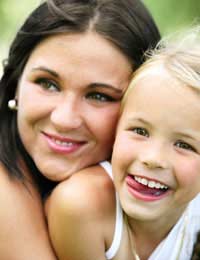
Pre-school age children are at a time in their life when they’re learning all the time, especially from things that are going on in the world around them. One way in which they learn is through example.
Your pre-school age child is likely to be on the ball and listening in to conversations taking place in the home and when you’re out and about. They’ll also be picking up on your behaviour and the way you react to certain things. Elements of your conversation and behaviour will be remembered and retained by your child, albeit sometimes in a slightly confused manner, and there’s a good chance they’ll copy it or use it themselves in their role play or games.
The fact that pre-schoolers learn through example should keep parents on their toes, although it’s easy to forget at times. The occasional parental slip on language may be inadvertently picked up by your child, who’ll take great pleasure in exploring the word and using it when you least expect it!
But apart from keeping you on your toes, there are a lot of positive ways in which you can help pre-schoolers learn through example. In fact, you can help a wide array of knowledge skills, from emotional and social issues, such as how to interact with other people and deal with emotions, to practical skills, such as how to do certain things.
Learning Social Skills Through Example
Pre-schoolers can learn about vital social and emotional skills through learning by example. Children are observant and will take in how you, as parents, interact with other people – both family, friends, people serving in shops and strangers. As you go about your daily life and take your child with you, they will pick up well on your interaction and get a good idea of how you should act in certain situations.
You can add to a child’s knowledge by talking to them about behaviour and how different types of behaviour are appropriate for different situations. For example, in the playground, it’s fine for children to run around and make a noise, but also share the playground rides and equipment with other children.
But when they’re in a library and looking at books, it’s generally not appropriate to run around and be noisy, so they should learn to sit still, read books and be aware that other people are doing the same.
As well as social situations outside the home, there are key situation within the home too. A good example is eating a meal with the family, where everyone is sitting at the table. You may want to teach your child, through your own example, that it’s polite to try and finish your meal and put your cutlery neatly on your plate, or that it’s polite to wait until everyone has finished until you leave the table.
The more you teach your child about different social situations and the appropriate behaviour for the situation, the more competent and capable they’ll become when they find themselves in different situations.
Learning Emotional Skills Through Example
Children also learn about emotional skills and issues through example. They’ll pick up on situations and occasions when you’re happy or sad, angry or fed up, and you can help children understand what’s going on by the emotions you’re expressing. Ideally, children should be taught that it’s okay to express certain emotions in certain situations, like crying if someone dies or laughing if you’re happy. This will help them deal with their own emotions in a better way.
Learning Practical Skills Through Example
Children can also learn lots of practical skills through example. They’ll happily follow what both mum and dad do, or their older siblings, and will be eager to practice anything new that they learn. This could be anything from learning to pick up rubbish and put it in the bin, to using a watering can to help water the garden or plant some seeds. Even the must mundane activities for you can be a huge learning experience for a child!





Leave A Comment